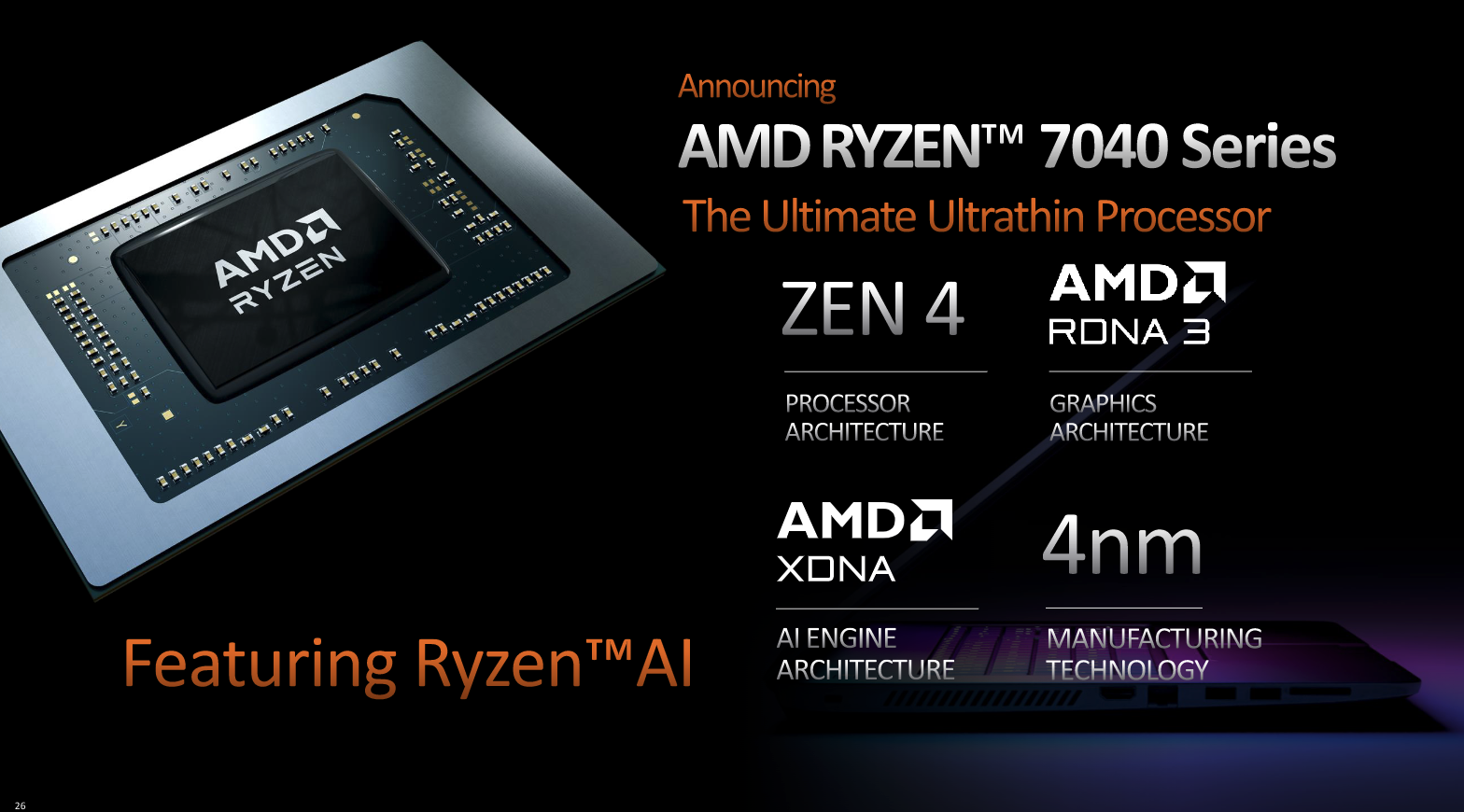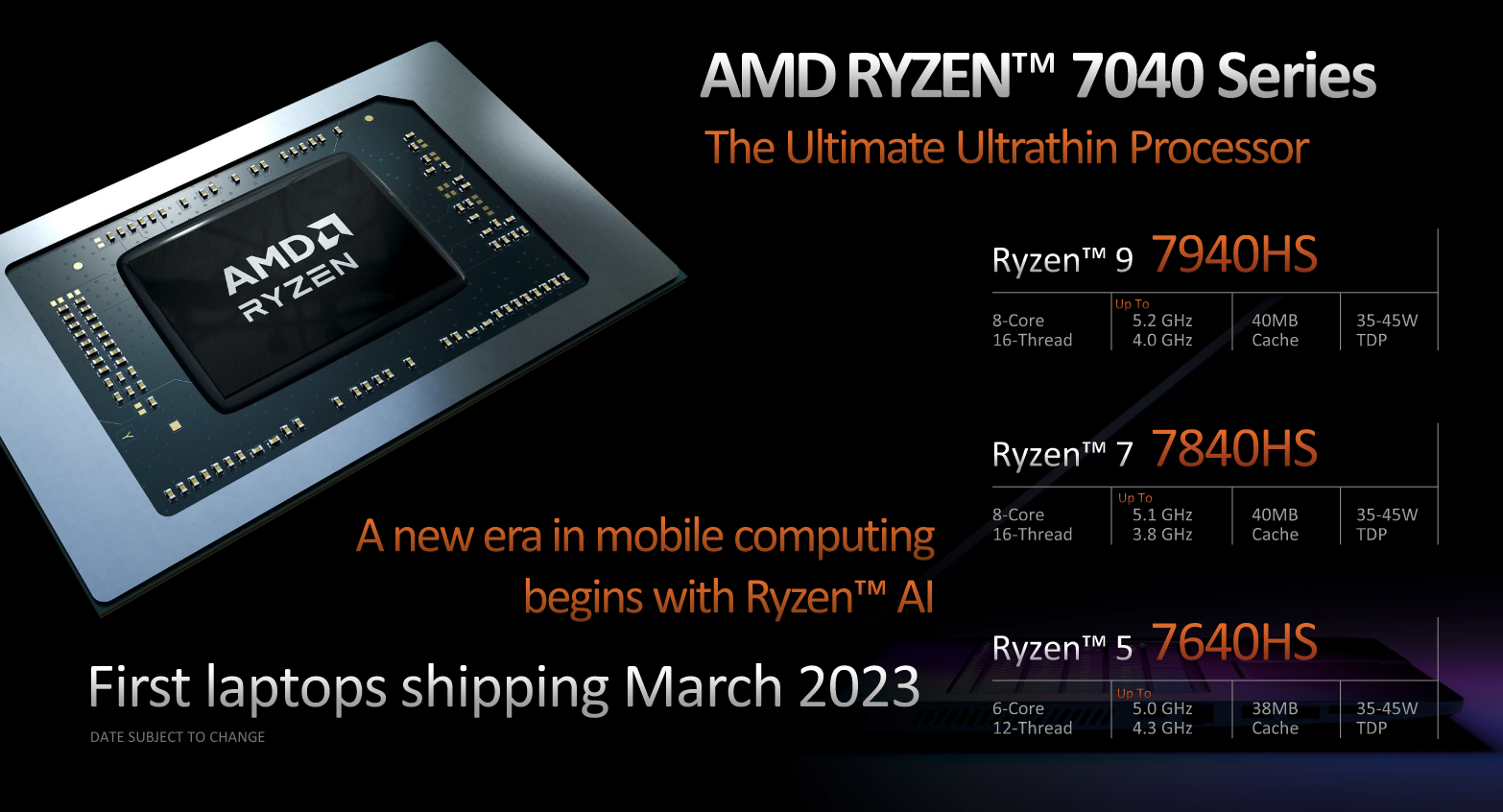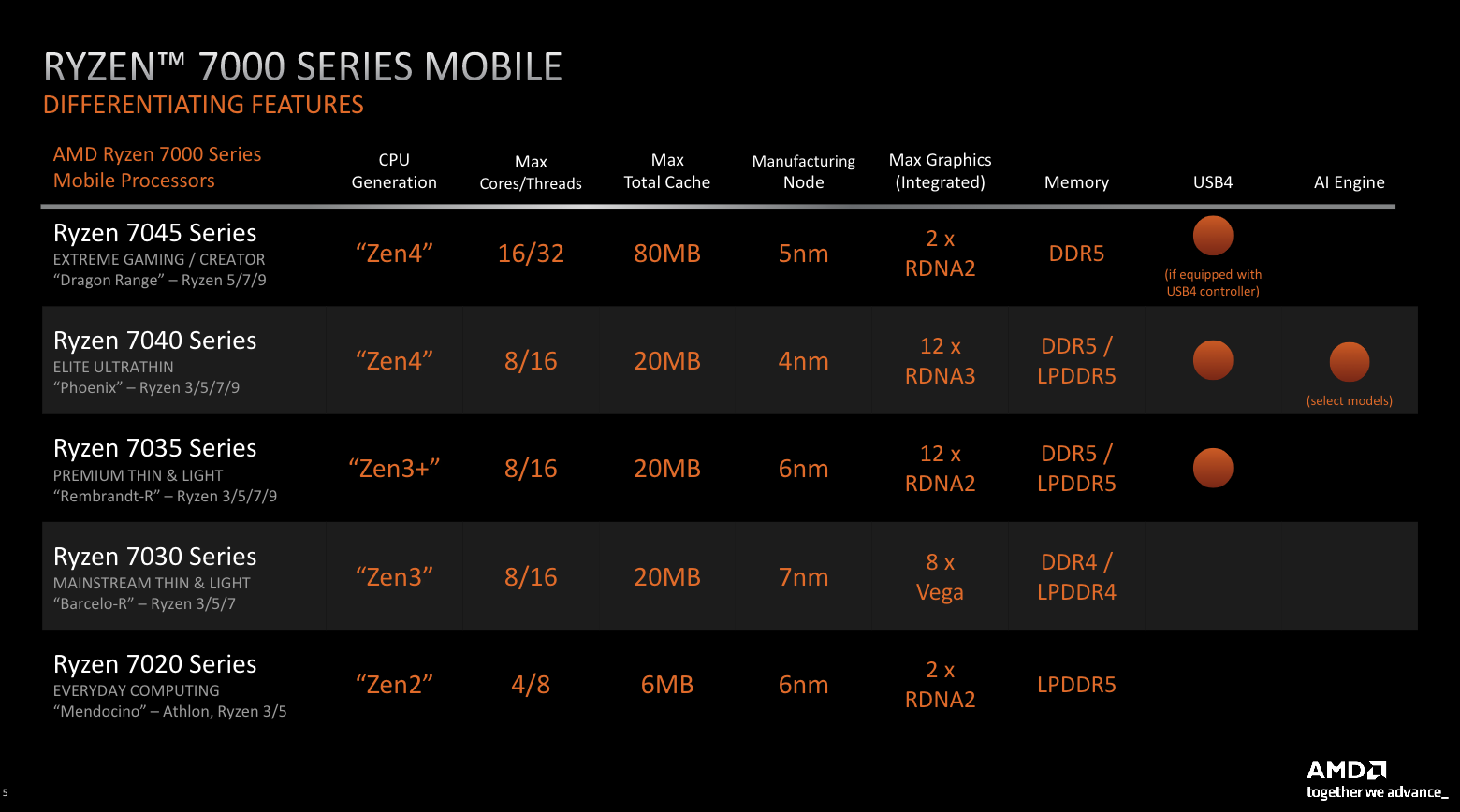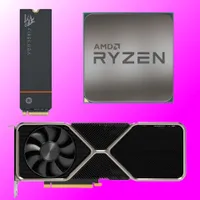AMD's new Ryzen 7040 Series laptop APU has special AI sauce
AMD beats Intel to putting a dedicated AI Engine into a consumer CPU.
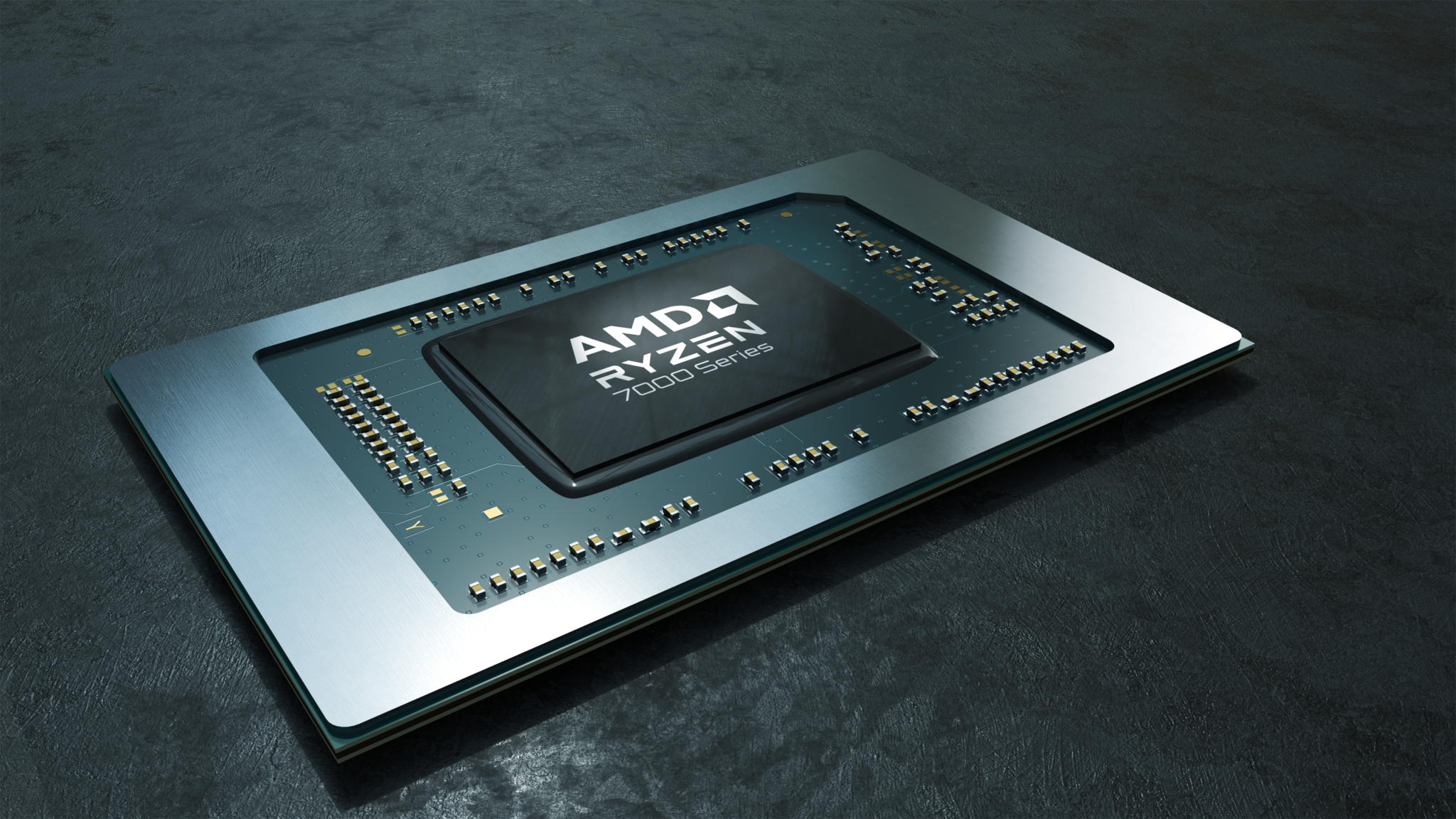
Keep up to date with the most important stories and the best deals, as picked by the PC Gamer team.
You are now subscribed
Your newsletter sign-up was successful
Want to add more newsletters?

Every Friday
GamesRadar+
Your weekly update on everything you could ever want to know about the games you already love, games we know you're going to love in the near future, and tales from the communities that surround them.

Every Thursday
GTA 6 O'clock
Our special GTA 6 newsletter, with breaking news, insider info, and rumor analysis from the award-winning GTA 6 O'clock experts.

Every Friday
Knowledge
From the creators of Edge: A weekly videogame industry newsletter with analysis from expert writers, guidance from professionals, and insight into what's on the horizon.

Every Thursday
The Setup
Hardware nerds unite, sign up to our free tech newsletter for a weekly digest of the hottest new tech, the latest gadgets on the test bench, and much more.

Every Wednesday
Switch 2 Spotlight
Sign up to our new Switch 2 newsletter, where we bring you the latest talking points on Nintendo's new console each week, bring you up to date on the news, and recommend what games to play.

Every Saturday
The Watchlist
Subscribe for a weekly digest of the movie and TV news that matters, direct to your inbox. From first-look trailers, interviews, reviews and explainers, we've got you covered.

Once a month
SFX
Get sneak previews, exclusive competitions and details of special events each month!
We've already reported on AMD's new 16-core mobile monster, the Ryzen 7045 Series. But it's arguably AMD's new laptop APU that's more interesting. May we introduce the AMD Ryzen 7040 Series, otherwise known as the Phoenix APU, and decked out with AMD's brand new and very intriguing "XDNA" AI engine.
AMD's naming conventions for the new Ryzen 7000 Series mobile chips as a whole may be a bit confusing, but bear with it because there's some exciting technology in this particular variant. The Ryzen 7040 Series is a more direct replacement for the old AMD Ryzen 6000 mobile chip, being a monolithic APU designed expressly for mobile where the Ryzen 7045 16-core monster is more of a repackaged desktop chip.
Like the old 6000 Series, the new 7040 Series tops out at eight CPU cores, but this time they're Zen 4 spec. AMD says the Phoenix APU is built on TSMC's 4nm node, where the 7045 Series' desktop-derived cores are on 5nm.
TSMC 4nm is closely related to its 5nm node, but does offer some efficiency advantages, which bodes well for battery life. How well, you ask? AMD is claiming up to 30 hours.
In practice, battery life depends on an awful lot of disparate elements of laptop design, most of which AMD has no control over. But 30 hours is still a very bold claim.
As for graphics, this new mobile APU gets the same 12CU graphics core count as the old "Rembrant" APU, but those CUs or compute units are upgraded from RDNA 2 to RDNA 3 specification. So, there should be a bit of a performance boost, even if we're not expecting anything hugely dramatic.
Intriguingly, despite the carry-over eight CPU cores and 12 graphics CU top config, AMD says this new Phoenix mobile APU has nearly double the transistors of the old Rembrant chip at 25 billion.
Keep up to date with the most important stories and the best deals, as picked by the PC Gamer team.
Part of that increase is down to the upgrades to Zen 4 and RDNA, plus the increase in cache to a total of 20MB. But some of that increased transistor budget has also been spent on what might just turn out to be the most interesting aspect of Phoenix, namely the insertion of a dedicated AI engine into a consumer AMD CPU for the first time.
AMD says it is using IP from its acquisition of adaptive computing specialist Xilinx at the beginning of 2022. The net result is what AMD is calling XDNA technology and when implemented in a CPU it's known as the Ryzen AI Engine.
Up to four concurrent AI streams are supported by the new AI engine. AMD reckons this AI block can be used to accelerate a wide variety of tasks. Perhaps the most notable claim for the Ryzen AI Engine is that it's faster than the Neural Engine in Apple's latest M2 chip. For now, that's impossible to confirm, but would be quite an achievement if true.
As for what you might do with the engine, one example is live video processing, including adding portrait blur, simulated eye contact similar to that Nvidia has also demo'ed recently and auto framing. AMD also says the AI block can be used to enhance gaming and take some of the load off the GPU.
For now, AMD isn't providing any specific examples of how XDNA tech will improve gaming. But being first to put a dedicated AI core into a CPU and beating Intel to that trick is a fairly major PR coup for AMD, at the very least.
Intel would, of course, counter that its 12th Gen Alder Lake and 13th Gen Raptor Lake chips, including the Core i9 13900K, sport Intel Deep Learning Boost tech which is also designed to accelerate AI workloads. But that's a vector neural network instruction extension to AVX512 rather than a dedicated hardware block. It won't be until the next-gen Meteor Lake architecture and its VPU or Versatile Processing Unit, due later this year, that Intel will have an actual dedicated AI hardware block in a consumer CPU.
How much impact any of this will have on gaming, however, is yet to be seen.
Best CPU for gaming: Top chips from Intel and AMD
Best gaming motherboard: The right boards
Best graphics card: Your perfect pixel-pusher awaits Best SSD for gaming: Get into the game first

Jeremy has been writing about technology and PCs since the 90nm Netburst era (Google it!) and enjoys nothing more than a serious dissertation on the finer points of monitor input lag and overshoot followed by a forensic examination of advanced lithography. Or maybe he just likes machines that go “ping!” He also has a thing for tennis and cars.
